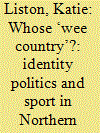|
|
|
Sort Order |
|
|
|
Items / Page
|
|
|
|
|
|
|
| Srl | Item |
| 1 |
ID:
146051


|
|
|
|
|
| Summary/Abstract |
International sport, as Geoffrey Pigman has correctly observed, emerged “as a quintessential case study demonstrating the part that public diplomacy plays in contemporary diplomacy.” The British Empire Games/Commonwealth Games [BEG/CG] are one such example, being the second largest multi-national multi-sport event today. Their origins lie in the interwar era when members of sporting organisations, many of whom were active in other formal aspects of public life, considered the organisation of specific Imperial events through international networking. Described as lacking a “thoroughly analytical and interpretive account of their history,” questions of identity politics, public diplomacy and statecraft are at their core because the BEG, inaugurated in 1930, represented qualities and values that appealed to governments, civil society, and sportspeople alike. In the waning of the British Empire, the BEG was one attempt to maintain Imperial prestige and cement cultural bonds. Yet, not only is there an absence of analytical accounts of their history, but the inter-relationships between the BEG and diplomacy, and among global sport and diplomacy more broadly, have been similarly under-investigated. This absence is striking, representing a missed opportunity in understanding the development of global sport and international relations more generally.
|
|
|
|
|
|
|
|
|
|
|
|
|
|
|
|
| 2 |
ID:
164302


|
|
|
|
|
| Summary/Abstract |
This article responds to calls in this journal for increased attention to identity, culture, power and sport. It explores, for the first time, the lived realities of identity politics in a divided society, through interviews with 12 self-declared Irish nationalists and republicans that represented Northern Ireland. Important insights are revealed into national eligibility decisions for either Irish team, motivated mainly by ‘shop window’ visibility and being seen as the best of a peer group. Political and sporting nationalisms were not necessarily analogous. A significant original finding is that the lived experiences of being closer to ‘the other’ resulted in an overall reinforcement rather than dissolution of difference. Visual and oral ‘national’ symbols such as flag, and especially anthem, delineated such difference, being symbolic walls of the mind. ‘Our wee country’ was thus a polarised and polarising fantasy shield. The article concludes by reconsidering the role of sport as a lens through which to examine identity and its’ place as part of the ‘problem’ and ‘solution’.
|
|
|
|
|
|
|
|
|
|
|
|
|
|
|
|
|
|
|
|
|